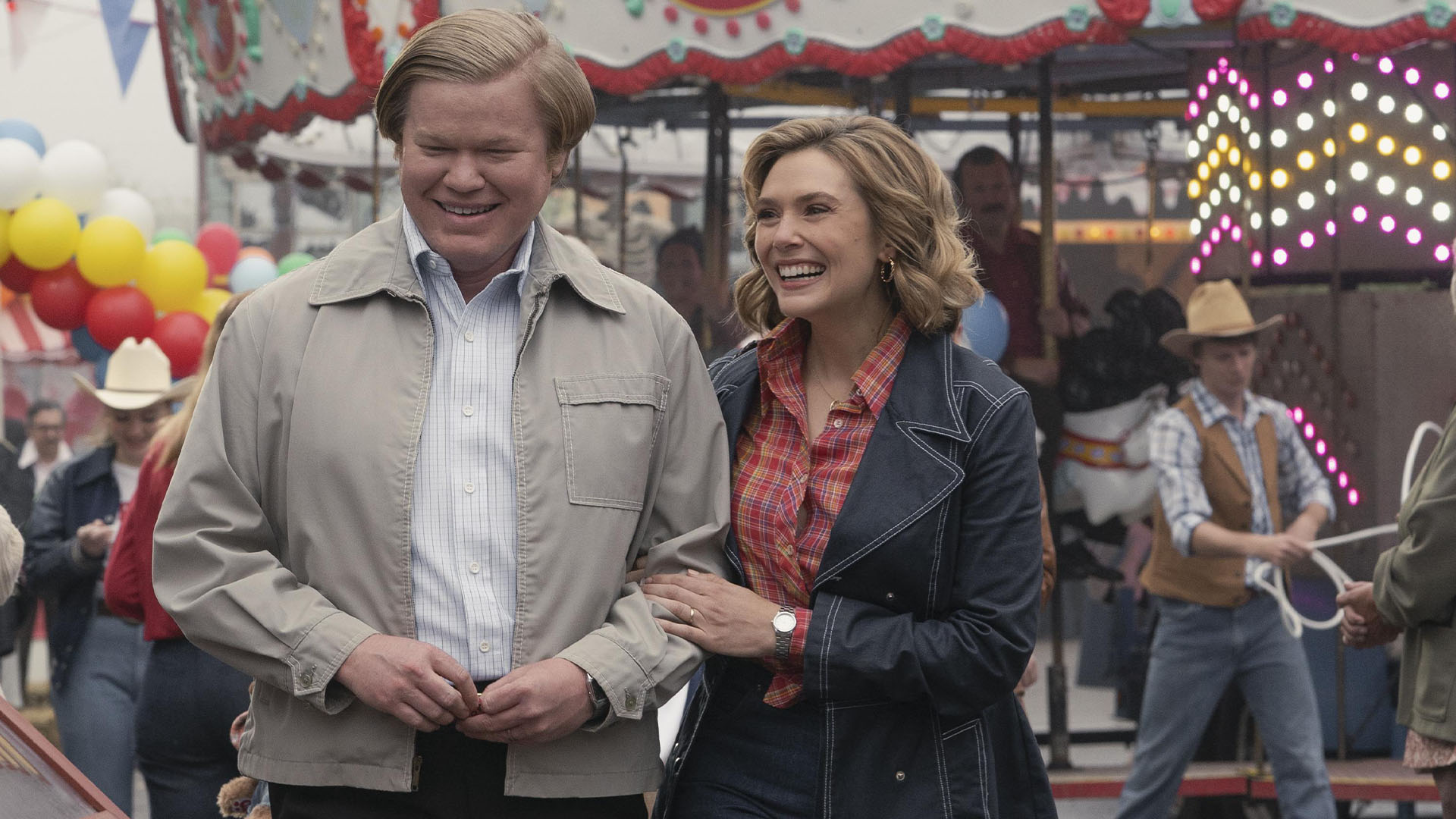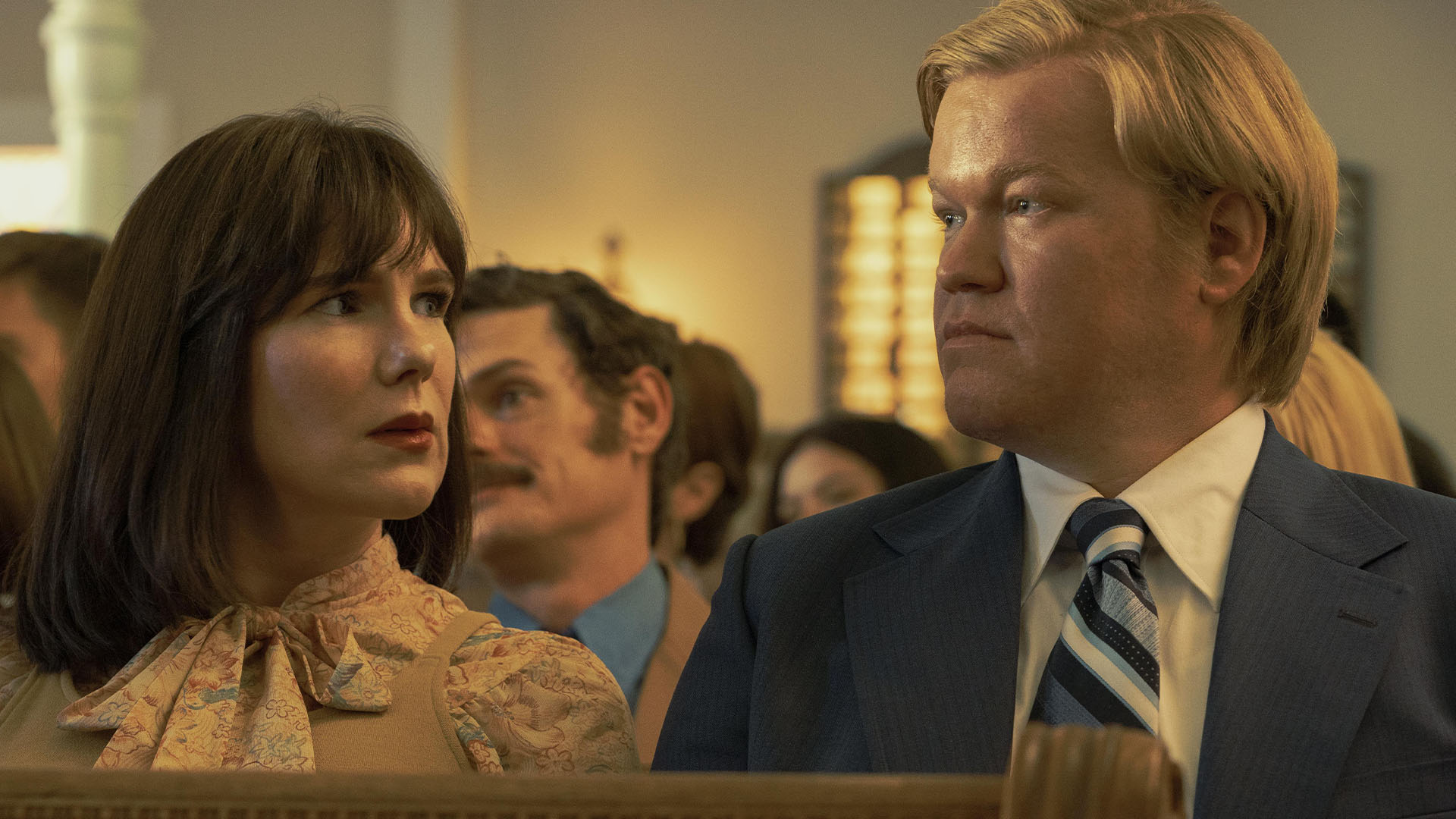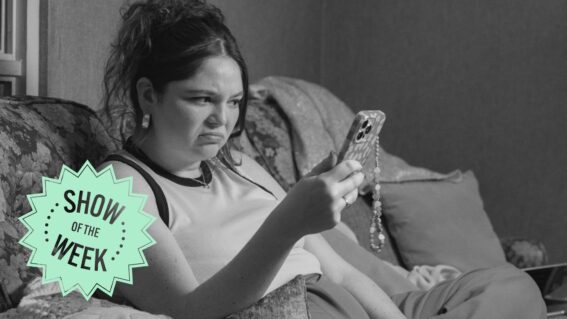Elizabeth Olsen is extraordinary in true crime axe-murder drama Love and Death
Turns a fascinating true crime story into a premium drama as complex as the real-life story it’s based on.


Elizabeth Olsen and Jesse Plemons star in true crime drama Love and Death – streaming on Neon. The mini-series turns a fascinating true crime story into a premium drama as complex as the real-life story it’s based on, writes Katie Parker.
Once the purview of gaudy daytime television, the streaming service era has seen true crime become the purview of premium drama, interrogating real-life horror stories with a previously unseen nuance and complexity. The latest of these is Love and Death, which casts Elizabeth Olsen as Candy Montgomery—a church-going, choir-singing, seemingly good-natured Texan housewife who surprised everyone in 1980 with a not-recommended-by-manufacturer use of an axe.
Written and produced by David E. Kelley—who, after Big Little Lies and The Undoing has now successfully rebranded himself from the king of comedies-about-lawyers to the king of domestic-dramas-sometimes-featuring-lawyers—and directed by Mad Men veteran Lesli Linka Glatter, this new seven-episode drama fills in the events preceding and following that terrible event, framing the story not so much a whodunnit, but as a what-the-hell-happened.
We meet Candy in the midst of a bout of domestic malaise. Wife to the dependable but dull Pat (Patrick Fugit), mother to two children, and a pillar of the community in the small town of Wylie, Texas, she is, on the surface, the American Dream come true. Yet in spite of her comfortable, busy life, Candy’s restlessness is palpable, and when a volleyball game sees her accidentally collide with mild-mannered fellow parishioner Alan Gore (Jesse Plemons), the split-second of contact awakens in her both desire but also defiance.

Suddenly inspired to seek excitement outside of her staid suburban life and mundane marriage, she pitches an affair to Alan as one might a business arrangement—and, following a series of decidedly unromantic strategy sessions, the pair put their plan into action at a seedy motel on the outskirts of town. Pat, along with Alan’s pregnant wife Betty (Lily Rabe), need never know. So how does an affair conducted in the spirit of a carefully managed corporate project, lead to something horrific?
The bored domestic housewife is a trope that comes up time and time again, and in many ways, Candy’s ennui does not dramatically depart from the many iterations that have come before: a dull marriage, the drudgery of domestic tasks, an endless list of extracurricular distractions ranging from a writing workshop to reading aloud parables. What sets her apart is that she is entirely conscious of—and unapologetic for—her appetites.
An extramarital affair may be contrary to the doctrine of the church she and her social circle devote their lives to, but on a practical level, she realises that there’s also dishonesty in denying her own desires. Unlike the repressed, neurotic Betty, she is assertive, bordering on aggressive, as she goes about fulfilling the needs her dorky husband is blind to—and if it weren’t for the inevitable tragedy that awaits, it’s easy enough to think, why shouldn’t she?

Olsen is extraordinary in the role , and whether we see Candy as a cold-blooded killer or a woman ruined by one particularly unlucky day, can turn on a dime in her hands. Her trajectory, therefore, is riveting, even as we are aware of the bloody events that await her. Plemons, as likeable yet gormless schmo Allan, is the perfect foil to the formidable Candy, quiet, gentle and powerless in the face of a bossy woman. The criminally underappreciated Rabe, meanwhile, imbues poor doomed Betty with a sense of brittle vulnerability, with a capacity for pain that Alan’s carelessness dangerously underestimates.
In the recent deluge of true crime dramas, the truth—however you define that—enters into an uneasy partnership with the art of storytelling and 2022 saw two dramatically different attempts to mine this tension in Under The Banner Of Heaven and The Staircase. The former saw fit to solve various narrative problems with the somewhat unorthodox solution of fabricating its central character, and placing him in the middle of a series of real-life events. The latter, meanwhile, made a case for a kind of agnosticism, staging several different scenarios to account for the story’s pivotal tragedy, refusing to make a judgement either way as to which one actually happened.
Both series were excellent—each acknowledging in their own way the impossibility of truly rendering real-life events exactly as they were. Love and Death takes a different tack again, beginning each episode with the relatively bold claim: “This is a True Story”

Inspired by the book Evidence of Love: A True Story of Passion and Death in the Suburbs as well as a collection of articles about the case from Texas Monthly, Kelley certainly seems to have remained faithful to the version of events reported on in these texts. Though the end of each episode is punctuated with the caveat that “dialogue, scene and some events have been modified or created for dramatic purposes”, Love and Death seems at pains to tell its story more or less as it happened—one glaring exception being that Olsen has been spared the indignity of the poodle perm that her real-life counterpart sported, cutting, to the modern eye at least, a rather more alluring figure.
Arguably, though, aesthetic verisimilitude is a somewhat overvalued element of narrativised true stories. A character study rather than a costume party, Love and Death takes the characters at the heart of its tragedy seriously, ruminating on the nuances surrounding even this extreme act of violence—and, crucially, allowing room for various interpretations of what Candy did.
Compelling and compulsive in the way Kelley’s recent shows are famous for, Love and Death turns a fascinating true crime story into a premium drama as complex as the real-life story it’s based on.























